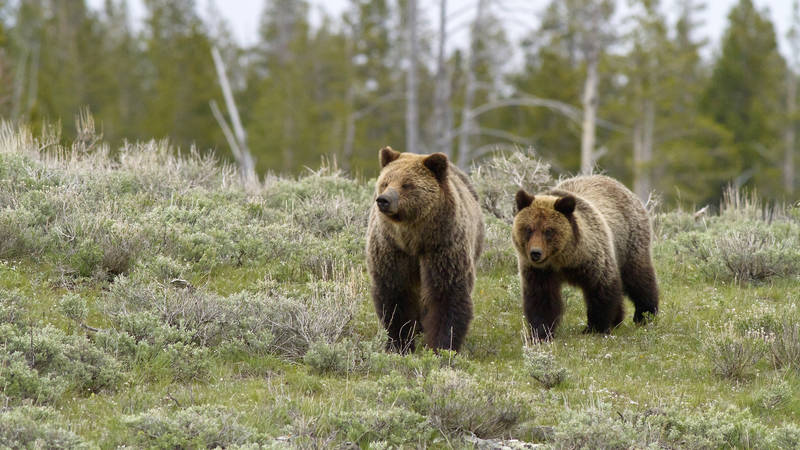Summer 2013
Mission Outdoors
Sierra Club program provides healing and camaraderie for war veterans.
One question buzzed through Stacy Bare’s mind continuously as the veteran of Operation Iraqi Freedom tried to readjust to civilian life: “What did I go and fight for?”
The year was 2006, and everywhere depressing traffic jams, lengthy airport security checkpoints, and suburban strip malls weighed on him. Where was the solace in the America he fought to defend?’
“When you first come home from war, you’re a hero, people cheer for you. But six months later, you find yourself scrubbing your toilet, or maybe you can’t find a job, and suddenly, a weird cycle sets in.”
THE VETERANS JOBS CORPS ACT
Bare found civilian life disorienting. There’s a common brotherhood that ties veterans together, a unique bond that allows them to willingly walk in harm’s way. “In combat, you end up believing in the guy to your right or to your left. As a civilian, opportunities are more limited to express your military experiences as an outdoor leader.”
Certain that other vets were dogged by some of the same post-war concerns, Bare eventually channeled that impulse into a perfectly suited position as director of Sierra Club’s Mission Outdoors, a program committed to creating opportunities for veterans and their families to experience nature’s healing powers.
“I didn’t set out to do ‘vet work,’ I didn’t plan to be a ‘veteran’s advocate.’ I just started climbing,” says the ardent outdoorsman.
Bare’s own experiences with post-traumatic stress disorder (PTSD) led him outdoors as often as possible. After Iraq, he went to graduate school at the University of Pennsylvania and then found a position in 2009 with Veterans Green Jobs, running energy-efficiency programs in Denver and Boulder. That’s when he started to really think about joining other vets in the great outdoors.
Bare knew the physiological benefits of exploring and enjoying the natural world regularly and the sense of camaraderie it offered. The mission to get somewhere, to complete something together, was familiar and deeply satisfying. “There’s a grounding effect of being in the outdoors with others,” says Bare.
Initially Bare took part in a free week-long Outward Bound trip for veterans, but he wondered, “What good are these once-in-a-lifetime trips? Shouldn’t access to the outdoors be something routine—shouldn’t we be doing it over and over instead of just for a week at a time?” Bare and another veteran founded Veterans Expeditions, and applied for a grant from the Sierra Club to extend their work; the group loved his proposal so much, they decided to hire him instead.
The Sierra Club has a long and proud connection to this sort of work. David Brower, the group’s first executive director, was a World War II veteran with the Tenth Mountain Division who came to the environmental movement as a result of his interest in mountaineering. During the war, he trained soldiers in cross-country skiing, mountaineering, and earned a Bronze Star in action in Italy.
Though many are surprised to learn of this natural connection between the nation’s oldest environmental group and the military, it speaks to another one of Bare’s frustrations that somehow “environmental concerns” fall only to those on the left. “National parks and public lands should not be a partisan issue,” Bare says, adding, “What greater expression of democracy is there than public lands?”
To drive his point home, last August, Bare’s team brought eight U.S. military veterans on a seven-day excursion through Glacier National Park in Montana to document the effects of global warming. A belief in human-caused climate change was not a prerequisite for the trip.
“We live in a country that is incredibly beautiful,” says Bare. “As service members, we fought for our land, our waterways, and our environment as much as we fought for anything else. But most veterans haven’t actually seen much of what makes these 50 states so fantastic.”
All veterans who deployed to Operation Iraqi Freedom, Operation New Dawn, Operation Enduring Freedom, or had duties in North Africa, the Middle East, or Central Asia since 2001 were encouraged to apply, as were veterans with physical or mental disabilities.
The point of the trip was to foster a lively discussion around climate change and America’s natural resources and to show “America the Beautiful” and how it may have changed since many went off to war. In addition to Bare, the climate reconnaissance team was led by James Balog, Extreme Ice Survey director, and Conrad Anker, world-class mountaineer and The North Face athlete. Balog had launched the Extreme Ice Survey in 2007 to document the effects of global warming on glacial ice.
The group set out to explore whether or not climate change is taking place by taking ice measurements and core samples in the park and mapping fast-disappearing glaciers, but due to an unexpected volume of snow, they instead compared their observations to data collected in 2006. The group also climbed a major peak along the Continental Divide. The expedition was filmed for a documentary that will be released next year. The reconnaissance trip has left lasting impressions on all of its participants.
“I love to push my body to the limits,” said Tyree Tucker, who has served in the military for 11 years and deployed to the Middle East four times. “I’m also interested in meeting people outside of my traditional circle. The trip did not force one specific belief, but it did encourage us to see that climate change is real. I’m not going to lie and say that I’m going to [purchase] the most fuel-efficient car as a result. But, I will remain more cautious in making decisions to help protect, maybe improve, the climate.”
Cathleen Ephgrave, a Marine Corps veteran of Operation Iraqi Freedom, also found the trip transforming. “I am not a climber,” she wrote on a Sierra Club blog. “I do not often stray from the beaten path. I hadn’t given much thought to climate change. But spending a week in the backcountry of Glacier National Park changed my outlook.”

National Parks
You can read this and other stories about history, nature, culture, art, conservation, travel, science and more in National Parks magazine. Your tax-deductible membership donation of $25 or more entitles…
See more ›Ephgrave had visited Glacier in 1997 with her family as a 14-year-old and said that the experience of going back 15 years later was eye-opening. Overlooking Grinnell Glacier, the group viewed photos from the 1800s through the present day, and the change in the glacier was astonishing. “For future generations to prosper, I believe climate change must be taken seriously, and I have learned that everyone can play a role in safeguarding our planet.”
John Turner, who deployed twice in support of Operation Iraqi Freedom, had been following the efforts of Mission Outdoors for a few years when he realized he was one of the vets that needed to get back outside.
“In the solitude of the wilderness and the company of fellow veterans and civilians from various walks of life, my service took on a different meaning. I serve out of a sense of duty and because I love my country and the way of life I am so fortunate to lead—and this includes the freedom to get outside and enjoy nature. This trip wasn’t about how to fix climate change or even to reverse it; it was all about discovery.”
For more information, visit www.sierraclub.org/missionoutdoors.



